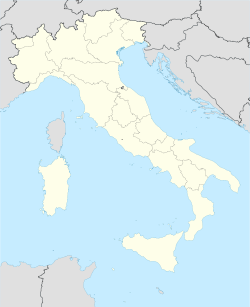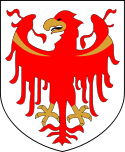Bolzano
- For the mathematician, see Bernard Bolzano; for other uses, see Bolzano (disambiguation).
| Città di Bolzano Stadt Bozen |
|
|---|---|
|
|
|
 |
|
| Country | |
| Region | Trentino-Alto Adige/Südtirol |
| Province | Bolzano-Bozen (BZ) |
| Mayor | Luigi Spagnolli |
| Elevation | 262 m (860 ft) |
| Area | 52.34 km² (20.2 sq mi) |
| Population (as of March 31, 2008) | |
| - Total | 101,063 |
| - Density | 1,931/km² (5,001/sq mi) |
| Time zone | CET, UTC+1 |
| Coordinates | |
| Gentilic | Italian: bolzanini German: Bozner |
| Dialing code | 0471 |
| Postal code | 39100 |
| Website: www.comune.bolzano.it | |
Bolzano (German: Bozen, archaic Botzen; Ladin: Bulsan; Latin: Bauzanum; many of the region's Italian languages/dialects use Bolzan or Bulsan) is a city in the Trentino-Alto Adige/Südtirol region of Italy. Bolzano is the capital of the province of Bolzano-Bozen.
The South Tyrol Museum of Archaeology in Bolzano is where the ice-mummy "Ötzi" is kept.
In 2008 Bolzano will be one of the locations in the region Trentino-Alto Adige where the seventh edition of the world renowned Manifesta, the European Biennial of Contemporary Art will be held.
The city is also the home of the Italian Army's Alpini High Command (COMALP) and some of its combat and support units.[1]
Contents |
History
Initially inhabited by the Raetians, the area was settled by the Romans in 15 BC, by general Nero Claudius Drusus, to whom referred the name of the first settlement in the area (an army camp with a bridge by the Isarco River). The nearby founded village was called Bauzanum. Bozen has been a trading point since its foundation and elevation to a town over 800 years ago, due to its location in between the two major cities of Venice and Augsburg. Four times a year a market was held and traders came from the south and the north. The mercantile magistrate was therefore founded in 1635. Every market season two Italian and two German officers (appointed from the traders who operated there) worked in this office. The city was a cultural crosspoint at that time.
Before World War I, Bozen was part of the Austro-Hungarian county of Tyrol. It was annexed by Italy at the end of World War I and later became capital of the autonomous Province of Bolzano-Bozen. Under Benito Mussolini the originally ethnic German city was Italianized quickly.
Society and economy
According to the 2001 census, 73% of the city inhabitants were Italian speakers. 26% speak German and 1% Ladin as their first language. The city thrives on a mix of old and new—high-quality intensive agriculture (including wine, fruit and dairy products), tourism, traditional handicraft (wood, ceramics) and advanced services. Heavy industry (machinery, automotive, steel) installed during the 1930s has now been mostly dismanteled. On the downside, the local economy is very dependent on the public sector, and especially the provincial government.
Bolzano was ranked as having the second highest quality of life of Italian cities in 2007, with neighbouring Trento topping the list.[2]
Main sights
The city's Italian-Austrian character, enhanced by the narrow cobblestone streets, Habsburg-era churches and pervasive bilingual signage give it the unique flavour of a city at crossroads between Italian and Austrian cultures. This, and its natural and cultural attractions make it a renowned tourist destination.
Among the major monuments and sights are:
- Walther Square, with a statue of Walther von der Vogelweide, the German minstrel (minnesinger);
- the South Tyrol Museum of Archaeology, which hosts the mummy of Ötzi the Iceman;
- the Gothic Cathedral, started in 1184, probably on the foundations of a Roman villa and rebuilt in the 14th Century by architects Martin and Peter Schiche (completed 1382);
- various castles, including Mareccio Castle, Roncolo Castle and Firmiano Castle;
- World War I Victory Monument, a controversial monument built by Mussolini in 1928.
- the Messner Mountain Museum Firmian
For more historical and geographical information, see Province of Bolzano-Bozen.
City districts and neighboring communities

City districts:
- Centro-Piani-Rencio (German: Zentrum-Bozner Boden-Rentsch)
- Don Bosco
- Europa-Novacella (German: Europa-Neustift)
- Gries-San Quirino (German: Gries-Quirein)
- Oltrisarco-Aslago (German: Oberau-Haslach)
Neighbouring communities are: Eppan an der Weinstraße, Karneid, Laives, Deutschnofen, Ritten, Jenesien, Terlan, and Vadena.
Other important nearby towns are Brixen, Bruneck and Merano.
Twin cities
 Sopron, Hungary
Sopron, Hungary
Transportation
Highway A22-E45 to Trento and Verona and to Innsbruck and Munich. Railway (main line between Italy and Germany).
The Bolzano Airport (IATA: BZO) has flights to Rome, Vienna, Milan and more.
Sport

Soccer Teams
- F.C. Südtirol-Alto Adige plays in Serie C2
- F.C. Bolzano 1996 plays in Eccellenza
Handball Teams
- SSV Bozen Handball A1
Ice Hockey Teams
- HC Bolzano Bozen Foxes plays in Serie A
References
External links
- (Italian) (German) Homepage of the city
- Tourism office of the city
- Bolzano travel guide from Wikitravel
|
|||||||||

